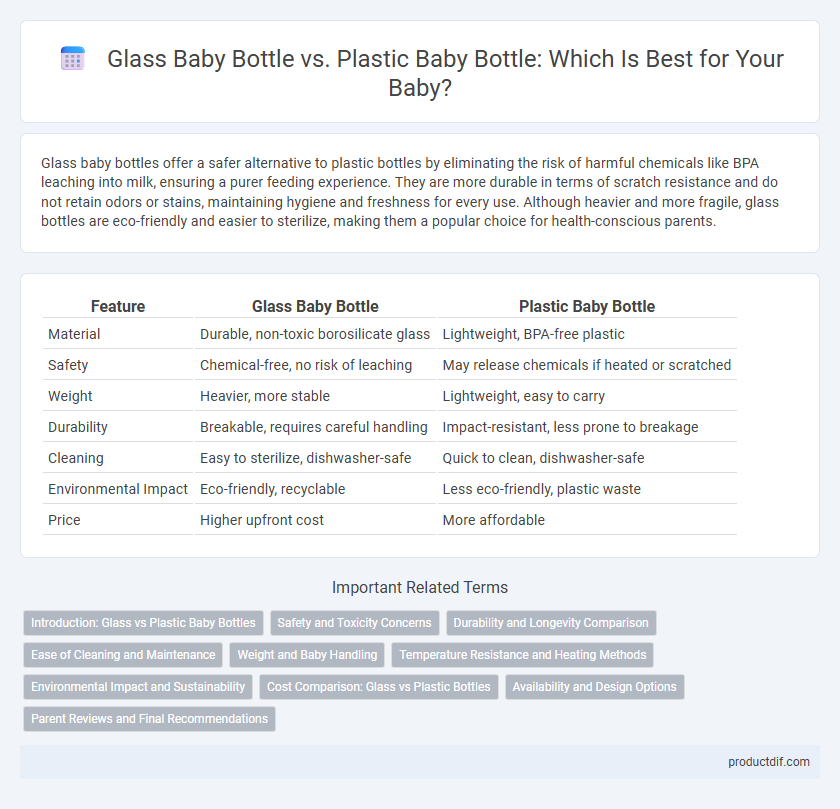Glass baby bottles offer a safer alternative to plastic bottles by eliminating the risk of harmful chemicals like BPA leaching into milk, ensuring a purer feeding experience. They are more durable in terms of scratch resistance and do not retain odors or stains, maintaining hygiene and freshness for every use. Although heavier and more fragile, glass bottles are eco-friendly and easier to sterilize, making them a popular choice for health-conscious parents.
Table of Comparison
| Feature | Glass Baby Bottle | Plastic Baby Bottle |
|---|---|---|
| Material | Durable, non-toxic borosilicate glass | Lightweight, BPA-free plastic |
| Safety | Chemical-free, no risk of leaching | May release chemicals if heated or scratched |
| Weight | Heavier, more stable | Lightweight, easy to carry |
| Durability | Breakable, requires careful handling | Impact-resistant, less prone to breakage |
| Cleaning | Easy to sterilize, dishwasher-safe | Quick to clean, dishwasher-safe |
| Environmental Impact | Eco-friendly, recyclable | Less eco-friendly, plastic waste |
| Price | Higher upfront cost | More affordable |
Introduction: Glass vs Plastic Baby Bottles
Glass baby bottles provide a chemical-free feeding option, known for their durability, resistance to staining, and ease of sterilization, making them ideal for maintaining hygiene. Plastic baby bottles are lightweight and less prone to breakage, often featuring BPA-free materials to ensure safety while offering convenience for travel and everyday use. Choosing between glass and plastic bottles depends on priorities like safety, durability, and ease of handling during infant feeding.
Safety and Toxicity Concerns
Glass baby bottles are free from harmful chemicals like BPA and phthalates, making them a safer choice for infant feeding. Plastic baby bottles may contain trace amounts of toxins that can leach into milk, especially when exposed to heat or wear over time. Prioritizing glass bottles reduces the risk of chemical exposure, promoting better health and safety for babies.
Durability and Longevity Comparison
Glass baby bottles offer superior durability, resisting scratches and odors better than plastic, which often degrades over time and can retain bacteria in micro-scratches. Plastic bottles, while lightweight and less prone to breakage, tend to yellow and crack after repeated heating and washing, reducing their lifespan significantly. Choosing glass ensures long-term use with consistent safety and hygiene, making it a preferred option for durability-conscious parents.
Ease of Cleaning and Maintenance
Glass baby bottles are easier to clean thoroughly as they resist staining and odors, and can withstand high-temperature sterilization without warping. Plastic bottles may retain milk residue and odors over time, making thorough cleaning more challenging and requiring careful selection of BPA-free materials. Regular maintenance with bottle brushes and sterilizers is essential for both, but glass bottles generally offer longer-lasting cleanliness and durability.
Weight and Baby Handling
Glass baby bottles are typically heavier than plastic ones, which can make them more challenging for babies to hold independently during feeding. Plastic baby bottles are lightweight and easier for infants to grasp, promoting better self-feeding development. When considering weight and baby handling, plastic bottles often provide greater convenience and comfort for both babies and caregivers.
Temperature Resistance and Heating Methods
Glass baby bottles offer superior temperature resistance, withstanding high heat without leaching chemicals, making them ideal for sterilization through boiling or microwave heating. Plastic baby bottles may warp or release harmful substances when exposed to high temperatures, often requiring caution during heating methods such as bottle warmers or microwaves. Choosing glass bottles enhances safety and durability during frequent heating and sterilization processes for infant feeding.
Environmental Impact and Sustainability
Glass baby bottles offer superior environmental benefits due to their reusability, recyclability, and non-toxic materials, reducing plastic waste and chemical pollution. In contrast, plastic baby bottles contribute to significant environmental concerns from microplastics and non-biodegradable materials in landfills and oceans. Choosing glass bottles supports sustainability efforts by minimizing carbon footprints and promoting resource conservation in baby product usage.
Cost Comparison: Glass vs Plastic Bottles
Glass baby bottles typically have a higher upfront cost compared to plastic bottles, but their durability and reusability often lead to long-term savings. Plastic baby bottles are generally cheaper initially, yet they may need frequent replacement due to wear and potential chemical degradation. Considering overall expenses, investing in glass bottles can be more cost-effective over time due to their longevity and reduced need for replacement.
Availability and Design Options
Glass baby bottles are widely available in various retail stores and online platforms, offering durable and chemical-free feeding solutions preferred by many parents. Plastic baby bottles provide extensive design options, including diverse shapes, colors, and built-in measurement markers, making them versatile and lightweight for everyday use. While glass bottles prioritize safety and longevity, plastic bottles excel in portability and variety, catering to different parental preferences and lifestyles.
Parent Reviews and Final Recommendations
Parents consistently highlight the durability and safety of glass baby bottles, praising their resistance to chemical leaching and easy sterilization, though noting their heavier weight and higher breakage risk. Plastic baby bottles receive favorable reviews for their lightweight design and portability, but concerns remain regarding potential BPA exposure and wear over time. Final recommendations emphasize choosing glass bottles for health-conscious families prioritizing safety and longevity, while plastic options suit on-the-go convenience with vigilant quality checks.
Glass Baby Bottle vs Plastic Baby Bottle Infographic

 productdif.com
productdif.com